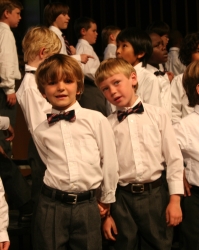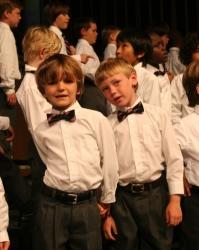
Singing helps children develop their inner world.
Singing provides an emotional release for children. It develops their sense of security and provides a way to express feelings that they might not be able to verbalize. When children sing spontaneously and invent their own songs, it inspires imagination. And because it involves active music making, it counters the influence of our consumer-oriented culture.
Singing encourages language development.
The development of communication and language is at the heart of children’s’ learning. Singing encourages communication, and increases vocabulary. Songs have very clear articulation and develop awareness of rhyme and meter. Singing also provides children a way to explore their vocal range, and to find a natural, expressive speaking voice.
Singing provides the best foundation for children’s’ musical development.
When children sing songs by ear, they are building musical memory. Later, as children learn to read and write music, singing helps to develop the musical ear. Through singing, children learn to hear the pitch before singing it and understand its relation to those around it—a more musical (and challenging) process than learning fingerings for different notes, and a skill that is necessary for instrumentalists as well as singers.
Singing in choirs fosters musical artistry and develops a sense of community.
Singing in choirs is one of the best ways for children to develop as musicians. Choirs help to shape children’s aesthetic sensitivity. Through singing in parts, children learn to be independent musicians while learning to respond to others musically. They take pride in their accomplishment together—and form lasting relationships with other children.
Singing builds awareness of one’s own and other cultures.
Songs, like stories, have been passed down through generations and in all cultures. Because they embody the beliefs and musical values of a culture, songs provide one of the best means for children to understand and appreciate different cultures and eras. When songs are in a foreign language, children gain language skills and an interest in other languages and cultures.
“If we ourselves sing often, this provides a deep experience of happiness in music....we learn to know the pulsation, rhythm and shape of melody. The enjoyment given encourages the study of instruments and the listening to other pieces of music as well.” Zoltán Kodály

